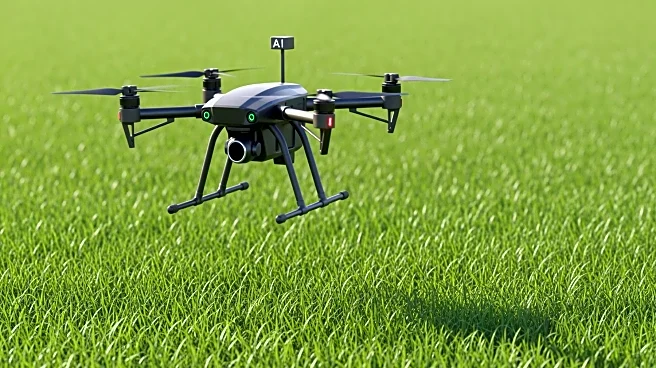What's Happening?
The integration of artificial intelligence (AI) in agriculture is revolutionizing farming practices by leveraging data-driven insights to optimize operations. AI technologies, such as predictive analytics,
automation, and robotics, are being used to improve decision-making in crop selection, planting schedules, and harvesting times. These technologies utilize data from sensors, drones, and satellite imagery to provide real-time insights into crop health, soil conditions, and resource needs. This allows for precise interventions, reducing input costs and increasing yields. Additionally, AI-powered automation, including autonomous tractors and smart irrigation systems, is reducing labor costs and increasing efficiency by handling repetitive tasks with minimal human intervention.
Why It's Important?
The adoption of AI in agriculture holds significant implications for the industry, offering potential benefits such as increased efficiency, reduced operational costs, and enhanced sustainability. By optimizing resource use and improving yield predictions, AI can help address global food security challenges and support sustainable farming practices. The technology also enables farmers to adapt to climate variability, reducing crop losses and improving resilience. However, challenges such as high implementation costs, data privacy concerns, and the need for technical training remain barriers to widespread adoption. Addressing these challenges is crucial to realizing the full potential of AI in transforming agriculture.
What's Next?
As AI continues to evolve, its role in agriculture is expected to expand, with advancements in hyper-precision farming and digital twin models. These innovations will further optimize field operations and enhance decision-making. The industry is also likely to see increased investment in AI technologies, driven by the demand for precision farming and supportive government initiatives. However, ensuring accessibility and affordability for smallholder farmers will be essential to achieving inclusive growth. Continued efforts in education, policy development, and infrastructure improvement will be necessary to overcome existing barriers and facilitate the broader adoption of AI in agriculture.
Beyond the Headlines
The integration of AI in agriculture raises important ethical and legal considerations, particularly regarding data privacy and ownership. As farms increasingly rely on data-driven technologies, ensuring the security and privacy of operational data becomes paramount. Additionally, the shift towards automation may impact labor dynamics in the agricultural sector, necessitating policies that support workforce transition and skill development. The long-term success of AI in agriculture will depend on creating an inclusive ecosystem that addresses these challenges while promoting sustainable and resilient farming practices.









